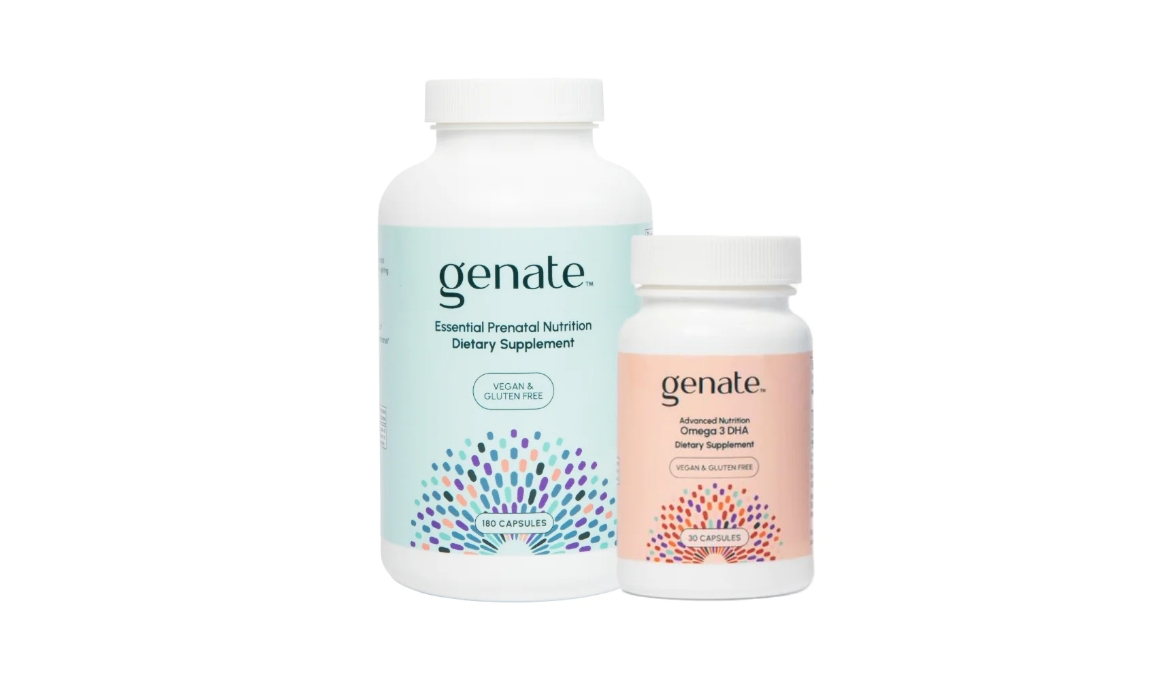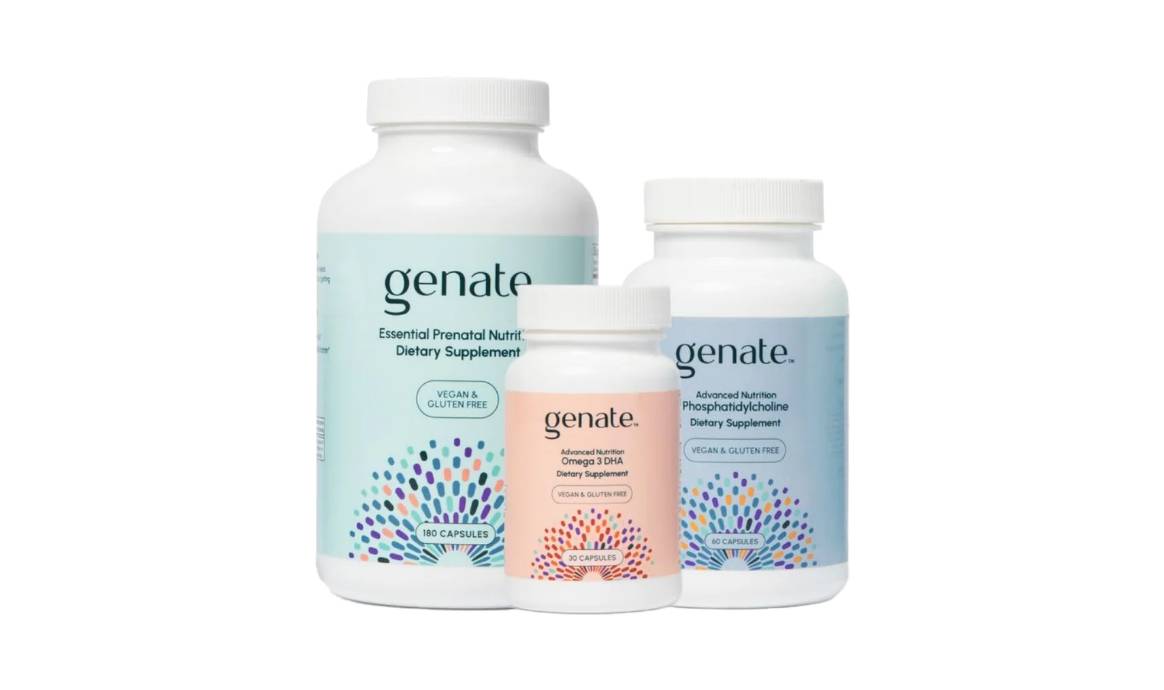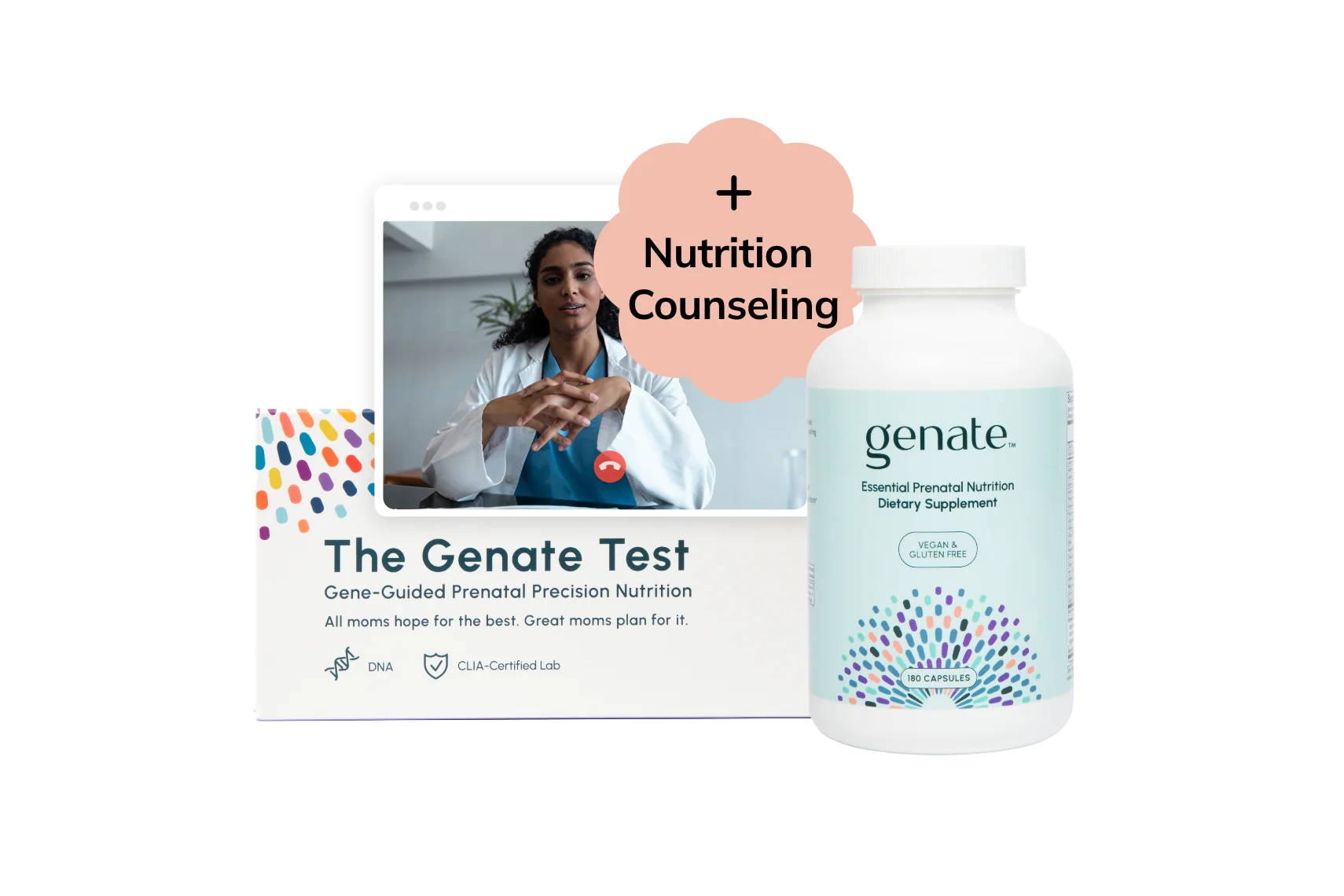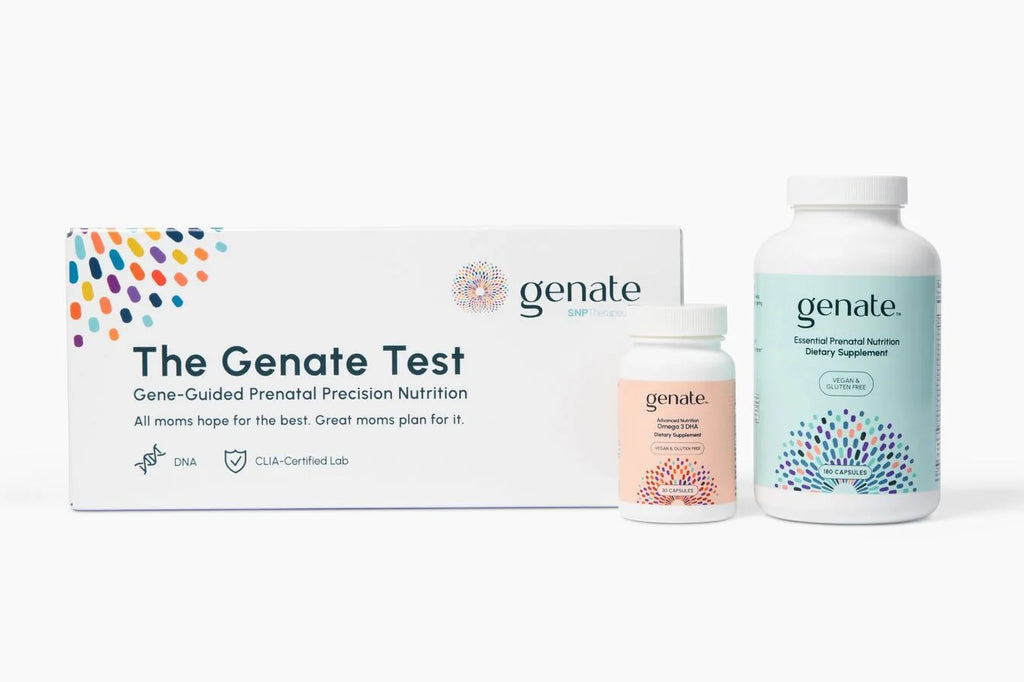Good nutrition is essential for every stage of your baby’s growth and development. But the efficiency with which your body metabolizes nutrients is partly determined by your genes, and common genetic variants can affect the metabolism of one-carbon nutrients that are critical for the development of your child’s brain and spinal cord. Genate Essential Prenatal Nutrition is a multivitamin formulated from academic research that provides women with a formulation optimized to support their baby’s cognitive development. It includes the one-carbon nutrients choline, betaine, methylfolate, and B vitamins that many women have trouble metabolizing and/or don’t get enough of in their diet.

Miscellaneous
A Guide to Exercising While You're Pregnant
by Ashley Reid, ACSM-EP, EIM • April 5, 2024 • 6-8 minute read
Finding out you are pregnant brings about many new emotions, some of which may be tied to the physical changes that are part of pregnancy. These changes can make it challenging to stay physically active, and choosing the right fitness program may feel overwhelming.
But exercise during pregnancy has lots of benefits for you and your growing baby. This article will break down the basics to help you get started on a prenatal exercise program and stay physically active through each trimester.
Is It Safe to Exercise While Pregnant?
Yes! Physical activity won’t harm your baby. Exercising while pregnant will not increase the chances of miscarriage, cause lower birth weight, or increase the likelihood of an early delivery for your baby. In fact, there are many benefits to exercising while pregnant.
Discover the genetics that affect your baby's cognitive development
Why Should You Exercise During Pregnancy?
Being physically active while you’re pregnant has some major perks for you and your baby. An increasing amount of research shows that regular exercise during pregnancy has more benefits than risks for most moms-to-be. The benefits of exercise during pregnancy include:
- Improved psychological well-being. Prenatal exercise helps with your mood not only during pregnancy but is also associated with lower levels of depression postpartum.
- Reduced risk of developing gestational diabetes and pre-eclampsia.
- Maintenance of a healthy weight. The goal of exercise during pregnancy isn’t to burn calories but rather to help your body continue to be efficient in using calories to prevent excess weight gain.
- Relief from common pregnancy complaints like constipation and sleep difficulties.
- Helping your body prepare both physically and mentally for labor and delivery.
If That’s Not Enough Motivation to Keep You Exercising, Consider the Benefits for Your Baby.
Prenatal exercise may:
- Lower the risk of passing down metabolic conditions like obesity to your baby.
- Give your baby a head start in brain development.
- Increase the chance that your baby is born at a healthy birth weight.
So What’s the Best Pregnancy Exercise Program?
Your prenatal fitness plan should help you strengthen the muscles weakened by pregnancy, lengthen the muscles that get tight during pregnancy, help you manage stress, keep your heart and lungs healthy, and keep your core strong.
Here’s a breakdown of the three main components of a pregnancy exercise program:
- Train all of the major muscle groups (chest, back, glutes, hamstrings, quads) through movement patterns (squat, hinge, lunge, push, pull) at least 2 days per week if you’re doing full-body workouts, or more frequently if you’re splitting up the muscle groups.
- Use moderate to vigorous intensity aerobic/cardio exercise to elevate your heart rate and increase your breathing. Most people will prefer low-impact exercise. A few safe pregnancy workouts that are low-impact include brisk walks, elliptical, indoor cycling, or swimming, but that’s not to say that if you’re a runner you can’t keep running if approved by your doctor. You should accumulate at least 150 minutes per week if you’re performing moderate-intensity exercise or 75 minutes if you prefer more vigorous activities. These could include more of an interval style workout or other formats of group exercise classes.
- Prenatal yoga, mobility training, or stretching will help you adapt to postural changes and muscle tightness. This type of movement can be performed during warm-ups and cool-downs or as a stand-alone session.
Although not included in the exercise guidelines, remember things like sleep, recovery, hydration, and how you fuel your body with food are important when it comes to making the most of your prenatal fitness program.
Exercises to Avoid During Pregnancy
Generally, most exercises are safe during pregnancy. However, there are a few types of activities that you should avoid or approach with caution:
- Activities with a high fall risk, like gymnastics, horseback riding, or skating.
- Impact sports that could harm your belly, like boxing or hockey.
- Activities that include lying flat on your back for prolonged periods.
- High-pressure activities like skydiving and scuba.
- Exercising at an altitude above 6,000 ft (unless you already live there).
When it comes to your health and your baby’s safety, ask your doctor if you have any individual health complications that may require you to abstain from certain workouts.
Don’t Forget to Individualize
Prenatal exercise guidelines recommend that you individualize your prenatal fitness plan. This means there isn’t a one-size-fits-all approach, and the exercises you find on a list of the “best exercises for each trimester” may not be the right ones for you.
So, how can you personalize your prenatal fitness plan?
Consider Your Ability
It’s safe to begin an exercise program during pregnancy, but if you’ve never run before, pregnancy probably isn’t the best time to start. If strength training is new to you, it’s best to learn the technique first and gradually progress to more challenging movements. Remember to work within your ability, and if you are inexperienced, choose beginner-friendly exercises.
Pregnancy is a great time to seek professional support from a qualified prenatal fitness professional. Although there isn’t a directory of prenatal/postpartum experts, consulting the United States Registry of Exercise Professionals is a great place to find highly qualified exercise professionals in your area.
If you come across online programs or classes at your local gym, be sure to ask for credentials. Your instructor or trainer should have prenatal/postpartum-specific training or certifications.
Think About the Activities You Enjoy
Choose an activity that doesn’t feel like a chore. Not into walking? Try dancing instead. Your program is only beneficial if you stick with it, so don’t base your choices on what other people are doing. Find a way to move your body in a way that you enjoy.
Adjust Workouts Based on Your Time and Energy
It’s common to feel fatigued during the first trimester. This would be a good time to keep your intensity low and allow for recovery between workouts. If you have plenty of energy in the morning, adjust your schedule so you can be active then. If you notice you’re sore after strength training, try less volume during your next workout.
Take Advantage of Prenatal Options When Possible
Although you may be able to attend your favorite fitness classes well into your pregnancy, if you find yourself having to modify a lot of moves throughout the class, it’s not serving you like it used to, and it’s time to find a program designed for your changing body.
What’s the Deal With Pelvic Floor Exercises?
You’ve probably heard of Kegels, but that might be where your knowledge on strengthening pelvic floor muscles during pregnancy ends. Pelvic floor training during pregnancy helps maintain a strong core so you feel stable enough to perform daily movements and complete workouts. These muscles also prevent leaking urine when you sneeze or cough.
Like any other muscle, pelvic floor muscles can be strengthened and lengthened. You want your muscles to be strong enough to adapt to the weight of your growing belly, but you also want to know how to relax them for labor and delivery. If you’re not into kegels, you can contract and relax your pelvic floor muscles when performing other strength exercises, making it more functional and saving you time.
The Takeaway
Being physically active and staying consistent with a prenatal exercise program can be amazingly beneficial to you and your baby. With all of the positive outcomes you’ll experience by exercise during pregnancy, it’s well worth taking the time to identify the plan and exercises that are right for you! Beyond exercise, nutrition is key for you and your baby. Support your health today with pregnancy nutritional counseling from Genate’s registered dietitians.
This article is not intended as medical advice to treat or diagnose any health condition but rather as educational health information for the general public. It should not be used as a substitute for individualized medical care from your healthcare provider.
Shop the Article
Save 23% today!
Genate Essential Prenatal Multivitamin + Advanced Omega-3 DHA Package
Bundle to increase savings and provide the foundational nutrients needed for optimal health and development.
From $72 per month
Save 23% today!
Comprehensive Prenatal Support Package
Genate Essential Prenatal Multivitamin + Advanced Omega-3 DHA + Phosphatidylcholine
Our most comprehensive bundle - you’ll receive our Essential Prenatal Multivitamin, Advanced Phosphatidylcholine, and Advanced Omega-3 DHA.
From $110 per month
Save 30% today!
Comprehensive Prenatal Nutrition Bundle
Buy the Genate Test and a nutrition counseling session with a Genate registered dietitian, and receive a 30-day supply of the Genate Essential Prenatal Multivitamin FREE. Purchase includes a 90-day prenatal multivitamin subscription at our best monthly price.
$309

About Ashley Reid, ACSM-EP, EIM
Ashley Reid is an Exercise Physiologist, Pre/Postnatal Wellness Practitioner, and the Founder of Active Mom Fitness. With her award-winning approach, Ashley has helped hundreds of moms stay active until their due date, safely return to exercise after having a baby, and gain strength and confidence to meet the physical demands of motherhood. With a background in strength and conditioning, Ashley goes beyond modifications and designs exercise programs specifically for the pregnant body and postpartum recovery, and the physical demands of caring for a child.
Ashley works with moms virtually, and in person at the Active Mom Fitness Studio in Philadelphia. She takes an inclusive approach to fitness that surpasses the harmful pregnancy ‘bounceback/bodyback’ culture, and guides moms to benchmarks that go way beyond weight loss as a measure of fitness achievement. Additionally, she provides training to fitness professionals so that more moms have access to the exercise guidance they deserve. As a mom herself, Ashley is thankful that exercise is a tool that allows her to be physically active with her daughter…resulting in so many fun memories!
Website: www.activemomfitness.com
Instagram: @activemomfitness
Facebook: @activemomfitnessphilly
LinkedIn: ashleyreidexphys
References
Ekelöf, K., Andersson, O., Holmén, A., Thomas, K., & Almquist Tangen, G. (2021). Depressive symptoms postpartum is associated with physical activity level the year prior to giving birth – A retrospective observational study. Sexual & Reproductive Healthcare, 29, 100645. https://doi.org/10.1016/j.srhc.2021.100645
Laker, R. C., Altıntaş, A., Lillard, T. S., Zhang, M., Connelly, J. J., Sabik, O. L., Onengut, S., Rich, S. S., Farber, C. R., Barrès, R., & Yan, Z. (2021). Exercise during pregnancy mitigates negative effects of parental obesity on metabolic function in adult mouse offspring. Journal of Applied Physiology. https://doi.org/JAPPL-00641-2020
Universite de Montreal. "Exercise during pregnancy gives newborn brain development head start." ScienceDaily. ScienceDaily, 10 November 2013. www.sciencedaily.com/releases/2013/11/131110204330.htm
Vargas-Terrones, M., Nagpal, T. S., & Barakat, R. (2019). Impact of exercise during pregnancy on gestational weight gain and birth weight: An overview. Brazilian Journal of Physical Therapy, 23(2), 164-169. https://doi.org/10.1016/j.bjpt.2018.11.012
Take the Genate Quiz
Take our Nutrition Quiz to learn more about your nutrition journey.
Read Our Latest Articles
Frequently Asked Questions
What are the benefits of my baby getting the proper nutrients?
What are one-carbon nutrients and fatty acids, and why are they important?
One-carbon nutrients and fatty acids are critical for brain and spinal cord development during pregnancy and through the first two years of life. Although all nutrients are important, the one-carbon nutrients choline, folate, betaine, and B vitamins, along with the omega-3 fat DHA, provide the building blocks for proper growth of your developing baby's brain. Research at Cornell and Harvard universities has shown cognitive benefits for children born to mothers who received increased levels of one-carbon nutrients during pregnancy, demonstrating that optimal nutrition during pregnancy can have lasting effects for your baby.
If I buy Genate nutrition supplements, do I still need to take the test?
Genetic testing is a personal choice, and only you can decide what’s best for you and your baby. But the Genate Test is a powerful tool for optimizing your nutrition status, as it identifies genetically-caused metabolic inefficiencies that may influence your body’ ability to make and use the nutrients critical for your baby’s cognitive development. If you have SNPs in any of the nutrient pathways tested, your Genate Report will provide personalized recommendations for optimizing your nutrition. Our registered dietitians can show you how to fill in the gaps with foods and supplementation, if needed, to make sure you’re getting the nutrition you and your baby need.








